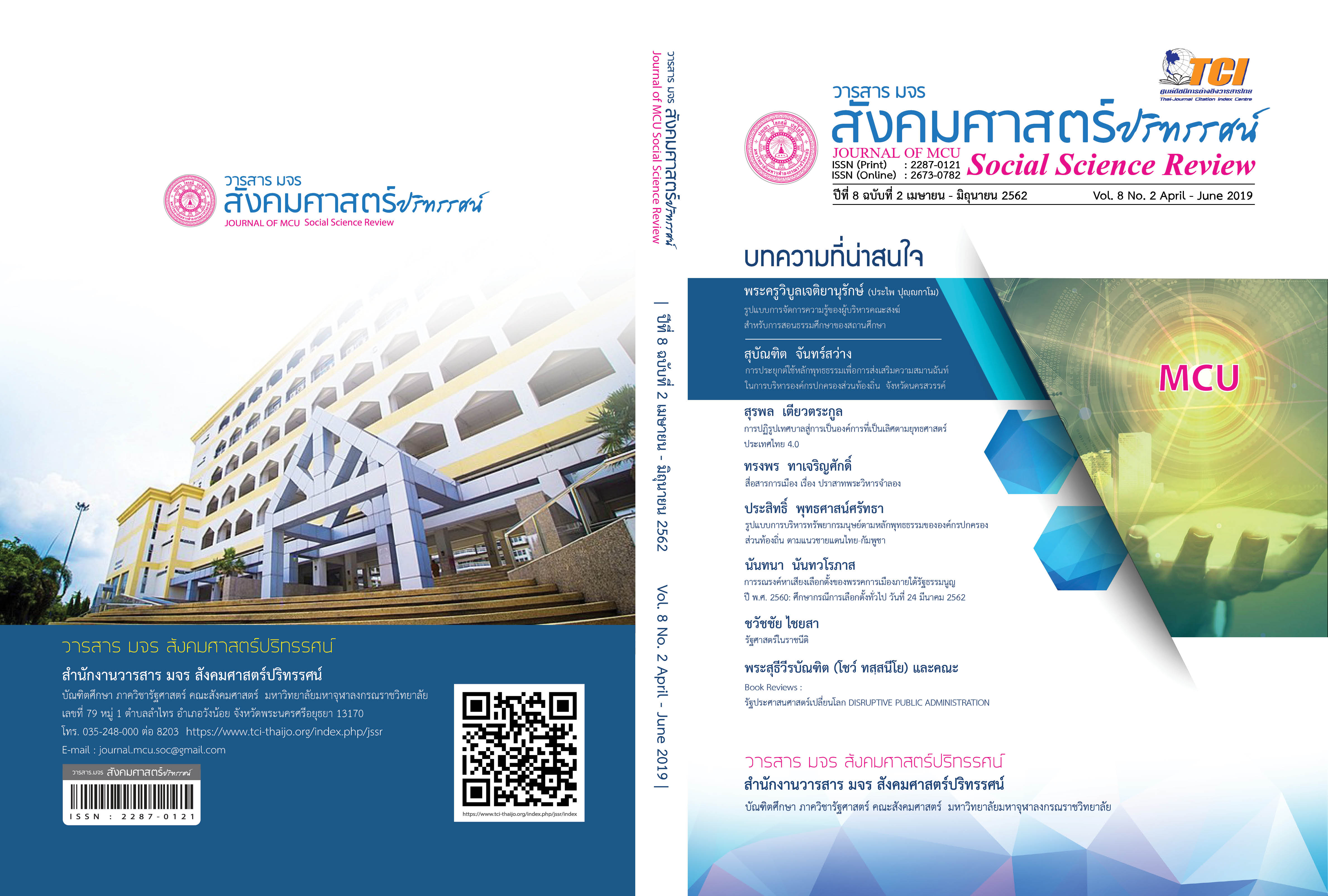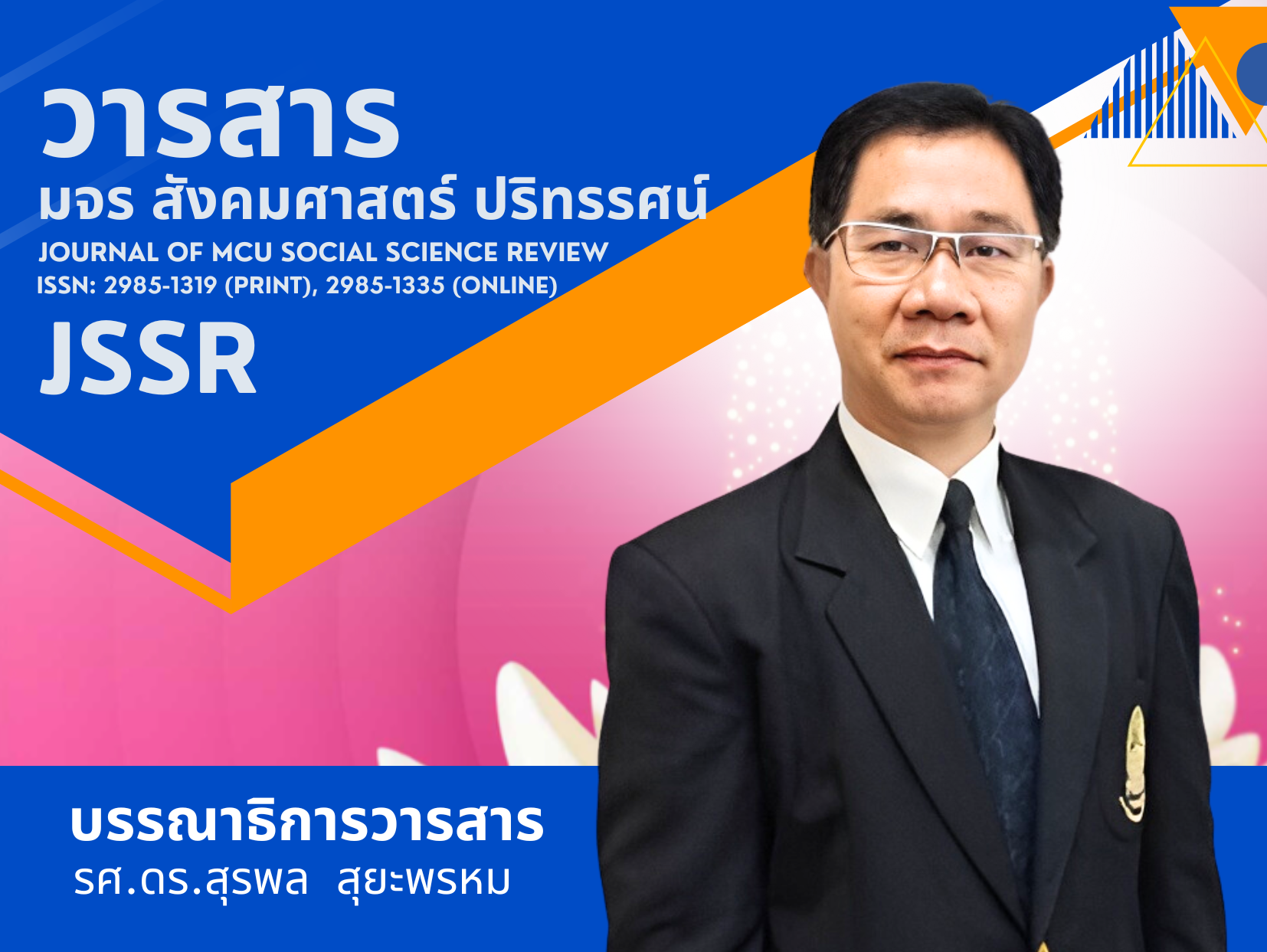THE ACHIEVEMENT OF COMMUNTITY DEVELOPMENT POLICY BASED ON THE SUFFICIENCY ECONOMY PHILOSOPHY OF SUB-DISTRICT ADMINISTRATIVE ORGANIZATIONS IN THE AREA OF CENTRAL PROVINCES OF THAILAND
Keywords:
the Achievement Community Development Policy, the Sufficiency Economy PhilosophyAbstract
The objectives of this research were to 1) study the factors affecting the achievement community development policy based on the Sufficiency Economy Philosophy of Sub-district Administrative Organizations in the area of central provinces of Thailand and 2) propose appropriate guidelines for improving the achievement community development policy. This research was a mixed methods research which combined qualitative and quantitative approaches. The qualitative research was conducted by studying relevant document and theory as well as conducting in-depth interviews with 12 key informants consisted of 3 persons of community development policy formulations, 3 executives of Sub-district Administrative Organizations and community leaders and they were purposively selected. The data were analyzed using content analysis. The quantitative was conducted by studying a sample of 400 people who were project participants living in the area of Prathum Thani, Saraburi and Aungthong provinces, which were in the central provinces of Thailand. They were selected by proportional muti-stage random sampling and simple random sampling. The sample size was obtained by calculations with Taro Yamane’s formula. The research tool for collecting the data was a 5 –level rating scale questionnaire with a reliability of 0.85. The data were analyzed using percentage, mean, standard deviation and stepwise multiple regression analysis.
The research results were as follows:
1) The factors affecting the achievement community development policy based on the sufficiency Economy Philosophy of Sub-district Administrative Organizations in the area of central provinces of Thailand, derived from qualitative study consisted of 3 factors, (1) policy component, strong sufficiency economy community creation, (2) sufficiency economy component, the creation of knowledge and understand in economic foundation in various dimensions by considering of the immune in global changes and (3) policy implementation component, the community participation on more networks creation for being sufficiency economy. The quantitative research revealed that factors affecting the achievement community development policy, consisted of 4 factors: (1) policy factor (β =0.779) with 1 variable of being able to evaluate, (2) sufficiency economy factor (β=0.879) with 3 variables, reasonable, immunization, knowing and understanding, (3) policy implementation factor (β = 0.841) with 2 variables; appropriate leadership and community participation. These 3 factors explain 80.90 percent of the variance (R2=0.809) of the achievement community development policy based on the Sufficiency Economy Philosophy of Sub-distract Administrative Organizations at the statistical level of significance of 0.05.
2) The appropriate guidelines for improving the achievement community development policy based on Sufficiency Economy Philosophy composed of 4 key practices : (1) the government should help support the community with the new products and provide more production housing. These supports could help the agriculturists to produce the higher quality products as in various developed countries in Asia and other western countries, (2) the family institution should be strengthened to increase the capabilities of the communities by conducting various activities based on the policy of Sufficiency Economy Philosophy to protect and solve the criminal problems, narcotics problems and social violence problems, (3) the government should support up in setting necessary organizations for creating cooperation. There organization should help develop the family institution in all aspects in protecting social violence problems and (4) the governmental sectors should support the agriculturalists in modern product processing to get more value added. Most importantly, the effective marketing supports from the government are most beneficial to the communities.
References
Development Department (2012-2016). Bangkok : Community
Development Department.
National Economic and Social Development Committee, Office. (2007). National
Economic and Social Development Plan, the 11th Plan (2012-2016).
Bangkok : National Economic and Social Development Committee
Pisan Sansorvisuth and et. al. (2005). The Administration of Kaothong Subdistrict
Administrative Organization Base on Community Entrepreneur
Department For Sustained Poverty Resolution. Thesis : Public
Administration Faculty of Humanity and Social Science. Graduate School of
Nakornsavam Rajabhat University.
Rojrek Tovanich. (2007). Project Evaluation of 30 baht to treat all Diseases
Case Study of Muang Distriet Uttaradit Province. Master Degree Public
Administration Thesis Faculty of Public Administration. Uttaradit Rajabhat
University.
Surakiat Satienthai . (1999). The King Modern Theory : Sufficiency Life. Bangkok :
Ruamdual Chaykan Publishing.
Aphichai Punsen and Editor (2007). Knowledge Synthesis in Sufficiency Economy.
Bangkok : Office of Research Fund Supporting.
Uraiwan Thanasathit. (2012). Thai Politics in Democracy. Bangkok : Thai
Chamber of Commerce University.
Schneider, (2009). Employee Engagement: Tools Foranalysis, Ppractice, and
Competitive Advantage. Malden, MA: Wiley-Blackwell.
Valbuena, (2010). A novel EEG acquisition system for Brain Computer Interfaces.
International Journal of Bioelectromagnetism, 13(2), 74-75.
Downloads
Published
How to Cite
Issue
Section
License
In order to conform the copyright law, all article authors must sign the consignment agreement to transfer the copyright to the Journal including the finally revised original articles. Besides, the article authors must declare that the articles will be printed in only the Journal of MCU Journal of Social Sciences. If there are pictures, tables or contents that were printed before, the article authors must receive permission from the authors in writing and show the evidence to the editor before the article is printed. If it does not conform to the set criteria, the editor will remove the article from the Journal without any exceptions.





